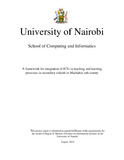| dc.description.abstract | Information Communication Technologies (ICTs) plays a crucial role in all aspects of human life. Its effectiveness, efficiency and accuracy cannot go unnoticed. ICT has the potential to integrate world economies thus demolishing the barriers created by time and distance. Inspite of its role in improving service delivery, its integration in teaching and learning process in Kenya has been low and limited.
This study reviewed a number of technology adoption models such as Theory of Planned Behaviour, Technology Acceptance Model, Unified Theory of Acceptance and Use of Technology and Diffusion of Innovation as well as educational theories namely behaviourism, cognitivism, and constructivism. The study adopted a descriptive research design approach and targeted public secondary schools in Machakos Sub-county.
The findings show that ICT integration in the teaching and learning processes in secondary schools in Machakos Sub-county is still low. This has been influenced by a number of factors such as ICT competence among teachers, ICTs infrastructure as well as technical support. Interestingly ICTs infrastructure and technical support were not major determinants. The study also established that gender, age and experience also influenced the integration of ICTs in the teaching and learning processes. Lack of funds, poor training on ICTs usage among teachers as well as lack of incentives were some of the challenges identified in this study.
The study recommends that teachers’ readiness to integrate ICTs in teaching and learning process needs to be addressed by availing funds that could be used to organize in-service training as well as acquire the necessary infrastructure. Teachers need to be offered incentives such as lower workload in order to embrace the use of ICTs in their lesson delivery. Further there is need to develop curricula that encourages the integration of ICTs rather than leaving the decision to the individual teacher. The government in addition can develop policy guidelines on the integration of ICTs in teaching and learning process. | en_US |

